Regulation of International Financial Markets and Banking
The research group "Regulation of International Financial Markets and Banking" analyzes international capital flows and the effects of regulatory changes on financial stability. Financial integration promotes efficient capital allocation and risk sharing but also eases the transmission of shocks across borders.
Banking regulation has accordingly evolved in recent years, yet the full impact of these reforms remains unclear. Hence, the group focuses on two areas:
First, it investigates the drivers of international capital flows and their effects on financial stability. Periods of high financial integration often precede crises with lasting real-economy consequences. The aim is to understand how to ensure stable and effective credit allocation.
Second, it examines how changes in regulation and supervision influence cross-border banking, especially within the context of European integration. This includes evaluating the balance between regulatory harmonization and unintended market distortions.
Two data projects support this research: the International Banking Library, a web-based platform for research exchange with a quarterly newsletter reaching more than 700 subscribers, and the Financial Markets Directives Database, which documents the implementation of key EU financial regulations with a special focus on the European Banking Union. Together, they promote evidence-based policymaking and enhance the group's global visibility.
Research Cluster
Economic Dynamics and StabilityYour contact

- Department Financial Markets
EXTERNAL FUNDING
10.2021 ‐ 06.2025
Distributional Effects of Macroeconomic Policies in Europe (DEMAP)
Leibniz Association
The project examines how political measures at the level of the European Union, for example the European Recovery Fund, affect inequality between households.
07.2017 ‐ 12.2022
The Political Economy of the European Banking Union
Causes of national differences in the implementation of the Banking Union and the resulting impact on financial stability.
01.2015 ‐ 12.2017
Dynamic Interactions between Banks and the Real Economy
Refereed Publications
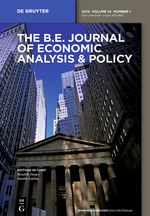
Elevated Uncertainty during the Financial Crisis: Do Effects on Subjective Well-being Differ across European Countries?
in: B.E. Journal of Economic Analysis and Policy, No. 2, 2019
Abstract
This paper focuses on the effect of uncertainty as reflected by financial market variables on subjective well-being. The analysis is based on Eurobarometer surveys, covering 18 countries over the period 2000–2013. Individuals report lower levels of life satisfaction in times of higher uncertainty approximated by stock market volatility. This effect is heterogeneous across respondents: the probability of being unsatisfied is higher for respondents who are older, unemployed, less educated, and live in one of the GIIPS countries of the Euro area. Furthermore, higher uncertainty in combination with a financial crisis increases the probability of reporting low values of life satisfaction.
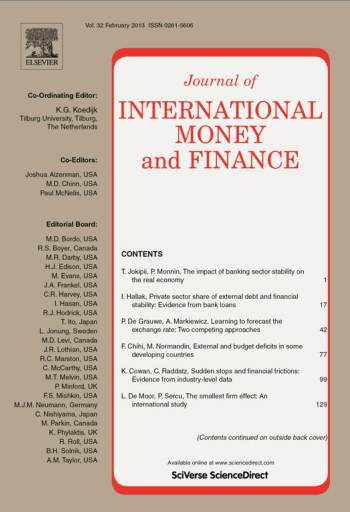
Drivers of Systemic Risk: Do National and European Perspectives Differ?
in: Journal of International Money and Finance, March 2019
Abstract
With the establishment of the Banking Union, the European Central Bank has been granted the power to impose stricter regulations than the national regulator if systemic risks are not adequately addressed at the national level. We ask whether there is a cross-border externality in the sense that a bank’s systemic risk differs when applying a national versus a European perspective. On average, banks’ contribution to systemic risk is similar at the two regional levels, and so is the ranking of banks. Generally, larger banks and banks with a lower share of loans are more systemically important. The effects of these variables are qualitatively but not quantitatively similar at the national versus the European level.

Political Influence and Financial Flexibility: Evidence from China
in: Journal of Banking and Finance, February 2019
Abstract
This paper investigates how political influence affects firms’ financial flexibility and speed of adjustment toward target leverage ratios. We find that at the macro level, firms in environments with high political advantages, proxied by provincial affiliations with heads of state as well as political status and party rank of provincial leaders, adjust faster. At the micro level, firms that are state-owned, have CPC members as executives, or bear low exposure to changes in political uncertainty adjust faster. When interacted, the micro-level political factors have more significant impact.
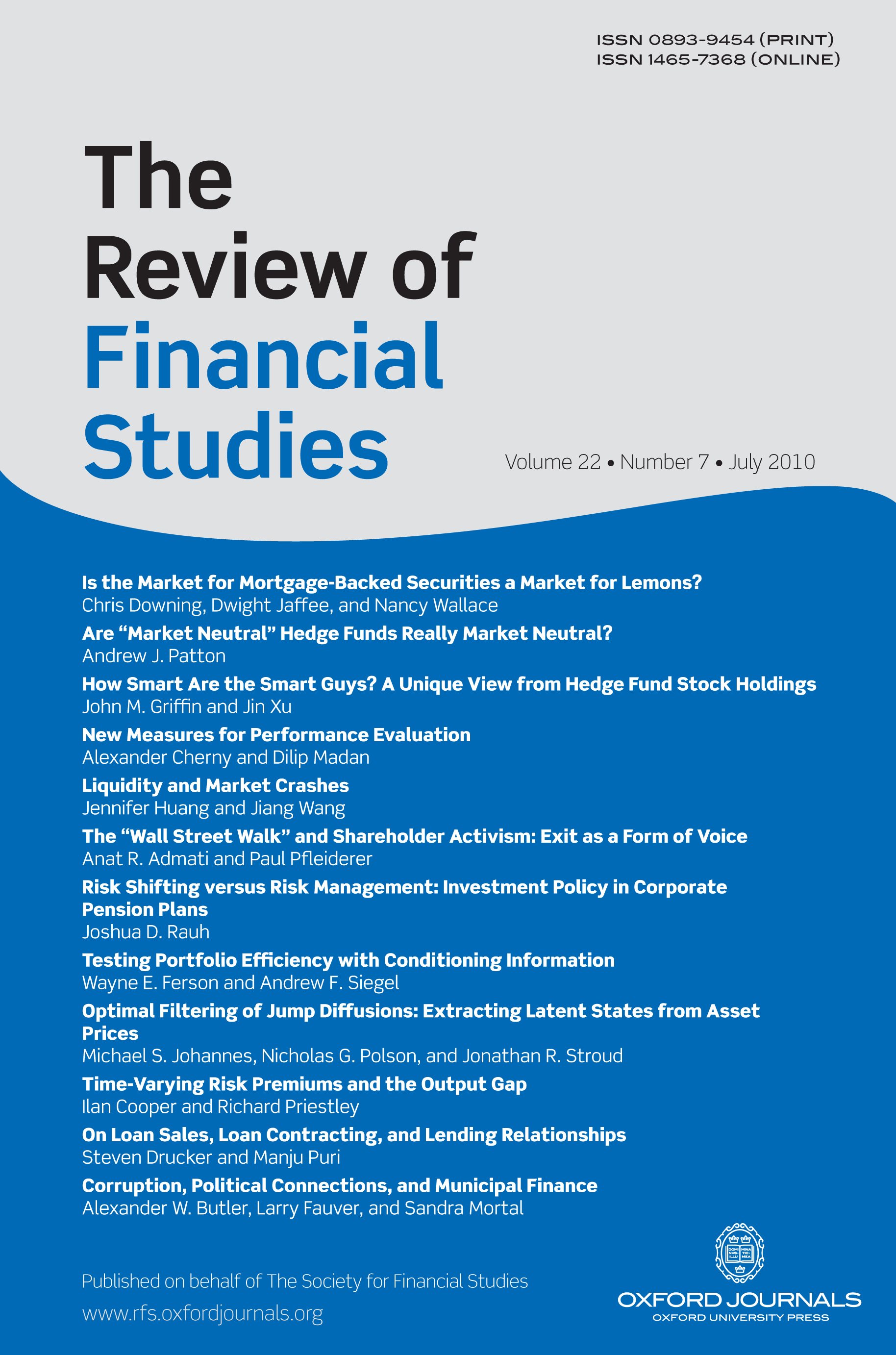
Banks Response to Higher Capital Requirements: Evidence from a Quasi-natural Experiment
in: Review of Financial Studies, No. 1, 2019
Abstract
We study the impact of higher capital requirements on banks’ balance sheets and their transmission to the real economy. The 2011 EBA capital exercise is an almost ideal quasi-natural experiment to identify this impact with a difference-in-differences matching estimator. We find that treated banks increase their capital ratios by reducing their risk-weighted assets, not by raising their levels of equity, consistent with debt overhang. Banks reduce lending to corporate and retail customers, resulting in lower asset, investment, and sales growth for firms obtaining a larger share of their bank credit from the treated banks.

Big Fish in Small Banking Ponds? Cost Advantages and Foreign Affiliate Presences
in: Journal of International Money and Finance, 2018
Abstract
We distinguish cost advantage at home from cost advantage vis-à-vis incumbent banks in destination markets to explain the probability of foreign bank affiliate lending. We combine detailed affiliate lending data of all German banks with public bank micro data from 59 destination markets. The likelihood to operate foreign affiliates depends positively on both types of cost advantage. Only cost advantage at home is economically significant. Generally, risk, return, and unobservable bank traits explain a larger share of the variation in foreign affiliate operations. Less profitable, more risky, and larger banks are more likely to operate affiliates abroad.
Working Papers
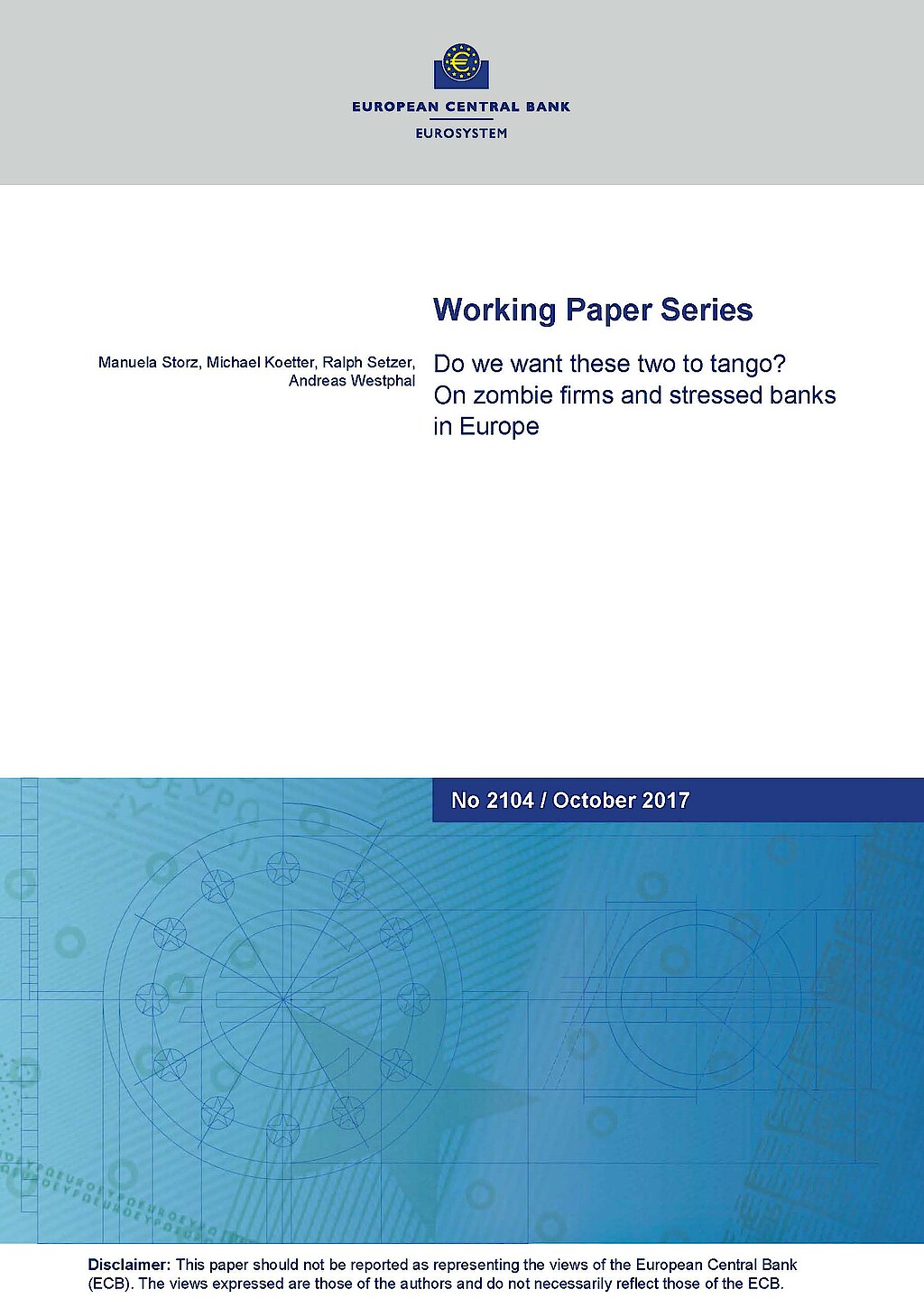
Do We Want These Two to Tango? On Zombie Firms and Stressed Banks in Europe
in: ECB Working Paper, 2017
Abstract
We show that the speed and type of corporate deleveraging depends on the interaction between corporate and financial sector health. Based on granular bank-firm data pertaining to small and medium-sized enterprises (SME) from five stressed and two non-stressed euro area economies, we show that “zombie” firms generally continued to lever up during the 2010–2014 period. Whereas relationships with stressed banks reduce SME leverage on average, we also show that zombie firms that are tied to weak banks in euro area periphery countries increase their indebtedness even further. Sustainable economic recovery therefore requires both: deleveraging of banks and firms.
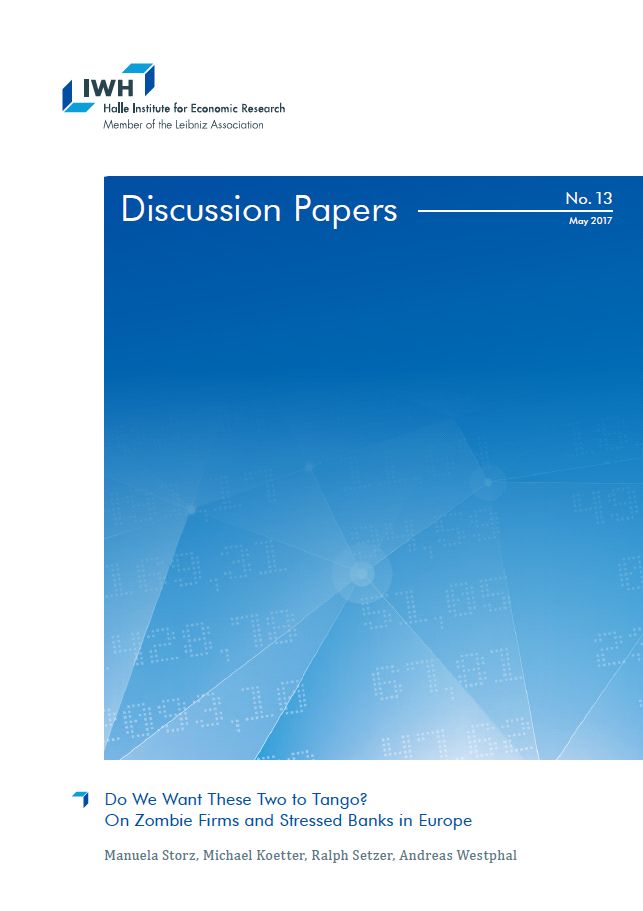
Do We Want These Two to Tango? On Zombie Firms and Stressed Banks in Europe
in: IWH Discussion Papers, No. 13, 2017
Abstract
We show that the speed and type of corporate deleveraging depends on the interaction between corporate and financial sector health. Based on granular bank-firm data pertaining to small and medium-sized enterprises (SME) from five stressed and two non-stressed euro area economies, we show that “zombie” firms generally continued to lever up during the 2010–2014 period. Whereas relationships with stressed banks reduce SME leverage on average, we also show that zombie firms that are tied to weak banks in euro area periphery countries increase their indebtedness even further. Sustainable economic recovery therefore requires both: deleveraging of banks and firms.

Inside Asset Purchase Programs: The Effects of Unconventional Policy on Banking Competition
in: ECB Working Paper Series, No. 2017, 2017
Abstract
We test if unconventional monetary policy instruments influence the competitive conduct of banks. Between q2:2010 and q1:2012, the ECB absorbed Euro 218 billion worth of government securities from five EMU countries under the Securities Markets Programme (SMP). Using detailed security holdings data at the bank level, we show that banks exposed to this unexpected (loose) policy shock mildly gained local loan and deposit market shares. Shifts in market shares are driven by banks that increased SMP security holdings during the lifetime of the program and that hold the largest relative SMP portfolio shares. Holding other securities from periphery countries that were not part of the SMP amplifies the positive market share responses. Monopolistic rents approximated by Lerner indices are lower for SMP banks, suggesting a role of the SMP to re-distribute market power differentially, but not necessarily banking profits.
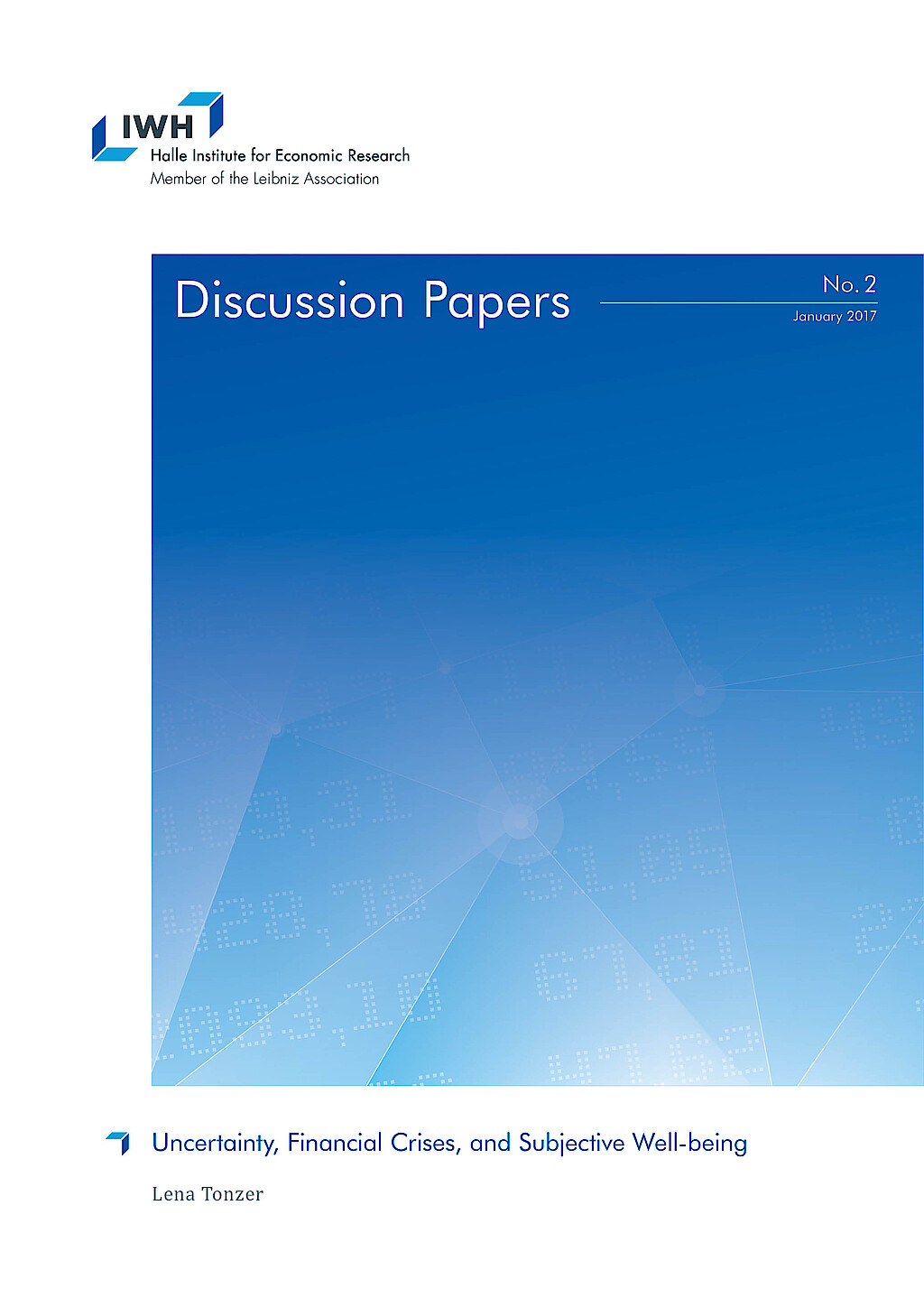
Uncertainty, Financial Crises, and Subjective Well-being
in: IWH Discussion Papers, No. 2, 2017
Abstract
This paper focuses on the effect of uncertainty as reflected by financial market variables on subjective well-being. The analysis is based on Eurobarometer surveys, covering 20 countries over the period from 2000 to 2013. Individuals report lower levels of life satisfaction in times of higher uncertainty approximated by stock market volatility. This effect is heterogeneous across respondents: The probability of being unsatisfied is higher for respondents who are older, less educated, and live in one of the GIIPS countries of the euro area. Furthermore, higher uncertainty in combination with a financial crisis increases the probability of reporting low values of life satisfaction.
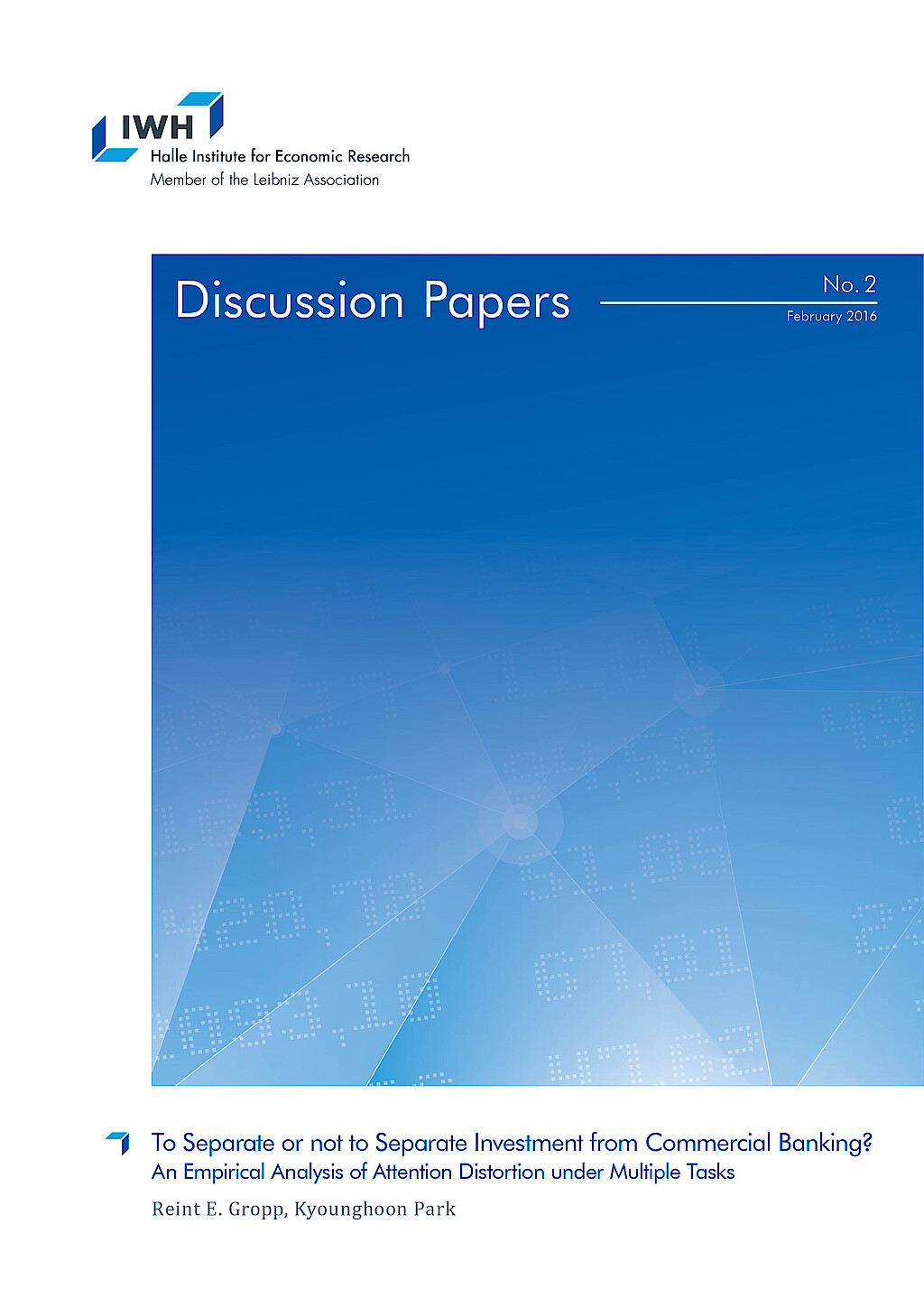
To Separate or not to Separate Investment from Commercial Banking? An Empirical Analysis of Attention Distortion under Multiple Tasks
in: IWH Discussion Papers, No. 2, 2016
Abstract
In the wake of the 2008/2009 financial crisis, a number of policy reports (Vickers, Liikanen, Volcker) proposed to separate investment banking from commercial banking to increase financial stability. This paper empirically examines one theoretical justification for these proposals, namely attention distortion under multiple tasks as in Holmstrom and Milgrom (1991). Universal banks can be viewed as combining two different tasks (investment banking and commercial banking) in the same organization. We estimate pay-performance sensitivities for different segments within universal banks and for pure investment and commercial banks. We show that the pay-performance sensitivity is higher in investment banking than in commercial banking, no matter whether it is organized as part of a universal bank or in a separate institution. Next, the paper shows that relative pay-performance sensitivities of investment and commercial banking are negatively related to the quality of the loan portfolio in universal banks. Depending on the specification, we obtain a reduction in problem loans when investment banking is removed from commercial banks of up to 12 percent. We interpret the evidence to imply that the higher pay-performance sensitivity in investment banking directs the attention of managers away from commercial banking within universal banks, consistent with Holmstrom and Milgrom (1991). Separation of investment banking and commercial banking may indeed be associated with a reduction in risk in commercial banking.















